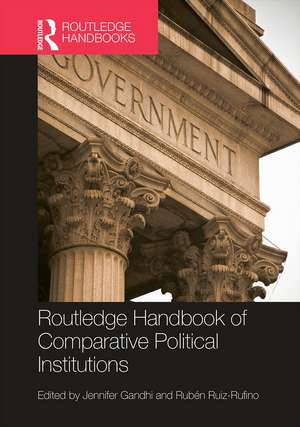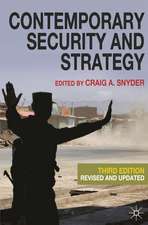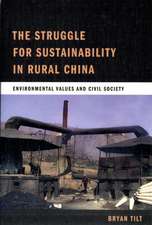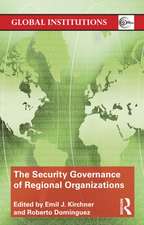Routledge Handbook of Comparative Political Institutions
Editat de Jennifer Gandhi, Rubén Ruiz-Rufinoen Limba Engleză Hardback – 9 apr 2015
- The first section, consisting of six chapters, is organized around broad theoretical and empirical challenges affecting the study of institutions. It highlights the major issues that emerge among scholars defining, measuring, and analyzing institutions.
- The second section includes fifteen chapters, each of which handles a different substantive institution of importance in comparative politics. This section covers traditional topics, such as electoral rules and federalism, as well as less conventional but equally important areas, including authoritarian institutions, labor market institutions, and the military. Each chapter not only provides a summary of our current state of knowledge on the topic, but also advances claims that emphasise the research frontier on the topic and that should encourage greater investigation.
- The final section, encompassing seven chapters, examines the relationship between institutions and a variety of important outcomes, such as political violence, economic performance, and voting behavior. The idea is to consider what features of the political, sociological, and economic world we understand better because of the scholarly attention to institutions.
Jennifer Gandhi is Associate Professor, Department of Political Science, Emory University.
Rubén Ruiz-Rufino is Lecturer in International Politics, Department of Political Economy, King’s College London.
Preț: 1245.93 lei
Preț vechi: 1880.25 lei
-34% Nou
Puncte Express: 1869
Preț estimativ în valută:
238.40€ • 249.58$ • 197.27£
238.40€ • 249.58$ • 197.27£
Carte tipărită la comandă
Livrare economică 07-21 aprilie
Preluare comenzi: 021 569.72.76
Specificații
ISBN-13: 9780415630887
ISBN-10: 0415630886
Pagini: 462
Ilustrații: 62
Dimensiuni: 174 x 246 x 30 mm
Greutate: 0.93 kg
Ediția:1
Editura: Taylor & Francis
Colecția Routledge
Locul publicării:Oxford, United Kingdom
ISBN-10: 0415630886
Pagini: 462
Ilustrații: 62
Dimensiuni: 174 x 246 x 30 mm
Greutate: 0.93 kg
Ediția:1
Editura: Taylor & Francis
Colecția Routledge
Locul publicării:Oxford, United Kingdom
Public țintă
Postgraduate and UndergraduateCuprins
INTRODUCTION 1. Introduction PART I APPROACHES TO STUDYING INSTITUTIONS 2. The New Economic Institutionalism in Historical Perspective 3. Studying Institutions 4. Endogenous Change of Institutions 5. Formal and Informal Institutions 6. Equilibrium Analysis of Political Institutions 7. Using Field Experiments to Study Political Institutions PART II COMPARATIVE POLITICAL INSTITUTIONS 8. Constitutions as Political Institutions 9. From Duverger to Rokkan and Back: Progress and Challenges in the Study of Electoral Systems 10. Parties and Party Systems11. Legislative Organization and Outcomes12. Executive-Legislative Relations 13. Coalition Formation and Policymaking in Parliamentary Democracies 14. Judicial Institutions 15. Federalism16. Bureaucracy 17. Election Administration, Election Observation, and Election Quality18. The Military’s Role in Politics19. Authoritarian Institutions 20. Fiscal Institutions 21. Labour Market Institutions and Economic Performance 22. Domestic Politics and International Institutions: Cooperation, Sacrifice, and Change PART III THE EFFECTS OF COMPARATIVE INSTITUTIONS 23. Voting Behaviour and Political Institutions 24. Ethnicity and Elections 25. Political Mobilization and Institutions 26. Political Violence: An Institutional Approach 27. The Institutional Context of Transitional Justice 28. The Institutional Components of Political Corruption 29. Political Institutions and Economic Development
Notă biografică
Jennifer Gandhi is Associate Professor, Department of Political Science, Emory University.
Rubén Ruiz-Rufino is Lecturer in International Politics, Department of Political Economy, King’s College London.
Rubén Ruiz-Rufino is Lecturer in International Politics, Department of Political Economy, King’s College London.
Recenzii
With a stellar line-up of brilliant authors and a wide range of chapter topics, the Handbook of Comparative Political Institutions should be indispensable to all scholars of comparative politics and political institutions.
Anna Gryzmala-Busse, University of Michigan
From the birth of modern political science in the early 20th century to contemporary rational choice institutionalism, political institutions have been a defining subject of our discipline. This Handbook covers the full terrain of analytical ideas and empirical regularities discovered by this great tradition and also points the way forward for future scholarship. This is a "must have" for any serious political science collection.
Simon Hix, London School of Economics
Gandhi and Ruiz-Rufino have brought together an outstanding set of scholars to provide a comprehensive treatment of political institutions and their impact. This volume will be essential reading for those interested in exploring the variety of ways in which the formal (and sometimes informal) rules of the game affect political, economic and social outcomes. A major contribution.
Daniel Posner, University of California – Los Angeles
This handbook is exceptionally clear, fresh, empirically rich, and analytically tight. It should be read widely because it is designed to serve as a comprehensive reference guide to accumulated knowledge of political institutions. It challenges some conventional thinking about how formal and informal political institutions operate under various types of government systems. What distinguishes this volume from existing literature is its focus on political institutions and ways they intersect with the study of mass behavior.
K. M. Zaarour, Shaw University, CHOICE recommended
Anna Gryzmala-Busse, University of Michigan
From the birth of modern political science in the early 20th century to contemporary rational choice institutionalism, political institutions have been a defining subject of our discipline. This Handbook covers the full terrain of analytical ideas and empirical regularities discovered by this great tradition and also points the way forward for future scholarship. This is a "must have" for any serious political science collection.
Simon Hix, London School of Economics
Gandhi and Ruiz-Rufino have brought together an outstanding set of scholars to provide a comprehensive treatment of political institutions and their impact. This volume will be essential reading for those interested in exploring the variety of ways in which the formal (and sometimes informal) rules of the game affect political, economic and social outcomes. A major contribution.
Daniel Posner, University of California – Los Angeles
This handbook is exceptionally clear, fresh, empirically rich, and analytically tight. It should be read widely because it is designed to serve as a comprehensive reference guide to accumulated knowledge of political institutions. It challenges some conventional thinking about how formal and informal political institutions operate under various types of government systems. What distinguishes this volume from existing literature is its focus on political institutions and ways they intersect with the study of mass behavior.
K. M. Zaarour, Shaw University, CHOICE recommended
Descriere
The Routledge Handbook of Comparative Political Institutions (HCPI) is designed to serve as a comprehensive reference guide to our accumulated knowledge and the cutting edge of scholarship about political institutions in the comparative context. It differs from existing handbooks in that it focuses squarely on institutions but also discusses how they intersect with the study of mass behaviour and explain important outcomes, drawing on the perspective of comparative politics.

















